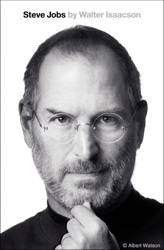Why I am not reading the biography of Steve Jobs
Oct 27, 2011 · 5 minute read · CommentsSteve Jobs
I have been surprised by how many people recently have been asking me if I am reading Walter Isaacson’s much-anticipated biography of Steve Jobs.

Cover of Walter Isaacson's biography of Steve Jobs
The funny thing is that many occurrences of this question of me are obviously just small talk, because other than on my blog and to a few people directly, I have never expressed publicly my deep admiration for Steve Jobs.
My answer is a firm No, but I don’t explain why because it’s just small talk, after all.
Here are some reasons, outside of the confining scope of small talk.
Overexposure
Right after Steve Jobs died, there was an explosion of articles and blog posts about him online. I only read a tiny fraction of what appeared, but even then, that was a lot. After a week, I was mostly done with wanting to see any more. I didn’t believe I would learn anything substantially new.
I find it hard to believe that Isaacson’s biography has any additional information, after all the time since Jobs’ death, that would help me better understand Steve Jobs and his life.
Biographies in general
When I was a child, I was fascinated by biographies and enjoyed seeking out reading brief child-oriented biographies of people like George Washington, Benjamin Franklin, Abraham Lincoln. (I was especially obsessed with Nathanael Greene and his campaigns during the American Revolution.)
As I got older, I realized that a lot of details were left out of biographies, and often even false myths were included, such that biographies were inherently a matter of reconstruction, interpretation, and even pure imagination.
If the purpose of reading a biography is to get close to knowing what really happened and why, then that is naive. At best, one can get some interesting snapshots and a point of view. There are always dozens of biographies of any celebrity. Which one to trust?
If the purpose is to find out how to emulate actions or habits of an individual in order to replicate the success that individual had, I think that is fairly naive also. We know that there is always a lot of luck involved in success, and specific contexts in which someone gets to thrive. For example, a lot of music conductors got their big break filling in for a conductor who was sick. Do I really need to wade through a whole biography in order to learn that being available as a substitute is a good way to take advantage of an accident?
Therefore, in general, I have not been excited about reading biographies. Any that I started, I stopped reading after a while. I still have not read a biography of Wolfgang Amadeus Mozart, for example, despite having intended to since my English teacher in high school showed us the film Amadeus on the last day of school, and that accidentally set in motion a whole chain of events leading to my discovery of Mozart’s music and more. The same goes for Beethoven or Einstein or any number of other heroes of mine. I am more interested in what people have produced than in the minute details (real or hypothetical) of their lives.
Steve Jobs
In particular, when it comes to Steve Jobs, it is not even what he produced that is of most interest to me (although I have expressed my indebtedness to the Apple II and Macintosh computers as a vehicle for my interest in computing as a user and as a programmer). In fact, some of what he has produced has always been of great concern to me: patent wars, a closed App Store ecosystem, a shaping of the computing world into a focus on consumption devices (such as iPods). Richard Stallman (who happens to be another hero of mine, without whom I would not have entered computing either) tells of the dangers bluntly.
What interests me most about Jobs is that he got stuff done. He worked hard, he had ideas, and he managed to get people to work together and implement his ideas. And he faced down failure and humiliation repeatedly, always bouncing back.
If, by chance, Jobs had mostly failed in his life, and not succeeded repeatedly, I am sure that there would not have been all the media coverage of his death, and all the tributes. He would have been just another loser. I get the impression that he has been praised because he succeeded, not because he tried. In fact, if he had failed, then probably all his negative traits and actions would have been the focus of attention. People would be blaming his authoritarian and often abusive management style for his failure.
The Steve Jobs I admire most is not the one who succeeded. It is the one who tried, and did fail, and did not give up.
The Steve Jobs I love is the philosopher who lived his philosophy, the one with the memorable quotes.
The Steve Jobs I want to keep in my memory is the one who said, “Your time is limited, so don’t waste it living someone else’s life.”
So guess what? Instead of wasting time reading his biography (as though living someone else’s life vicariously), in the weeks since his death I have been focused on following his advice and living my life, getting refocused on my goals and projects. RIP, Steve Jobs.